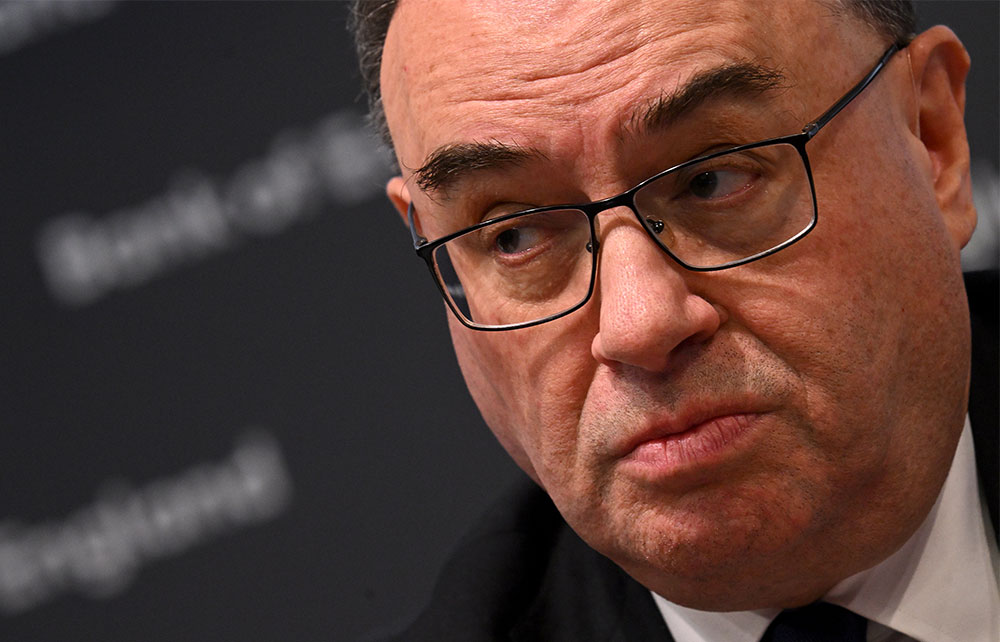The Governor of the Bank of England, Andrew Bailey, is a loyal and well-intentioned public servant in a role that, by its nature, attracts constant blame and hindsight judgment. Liz Truss is a spectacularly failed 44-day prime minister with a book to sell.
So when Truss says Bailey should have been sacked for his part in her downfall –when the Bank intervened to prevent a pension fund crisis after her chancellor Kwasi Kwarteng’s radical mini-Budget of September 2022 – and that he should be sacked anyway for being part of a Keynesian economic Establishment, with the Treasury and the Office for Budget Responsibility, that has delivered nothing but stagnation, my instinct is to stand up for Bailey.
But just for a moment, just as an intellectual exercise, let’s take the publicity-seeking Truss seriously and examine the case for the prosecution. Long before the mini-Budget fiasco, I described Bailey as a highly competent middle manager whose ‘misfortune’ was to have been promoted to the governorship. Other observers, reviewing his record as head of the Financial Conduct Authority between 2016 and 2020, disputed ‘highly competent’. Since then, nothing about the Bank’s market signalling and management of interest rates to combat the 11 per cent inflation spike it plainly failed to predict has boosted confidence in the Governor or his institution, even if the rate-hike medicine has eventually worked.
Central bankers are most effective when markets imbue them with mystical authority, as they did in recent times with Alan Greenspan at the US Federal Reserve and, for a while, Mario Draghi at the European Central Bank. The uncharismatic Bailey has never come close. And now we discover – in a report by another ex Fed chairman, Ben Bernanke – that the forecasting model on which Bailey’s Bank has based its decision-making is a Heath Robinson contraption of outdated IT and manual data inputs, too slow to spot the economic shifts on which rate-setters needed to act in good time.
If Bailey played a part in toppling Truss, it was for the good of the nation; everyone outside her Westminster clique knew she was a disaster. But the charge sheet against the Governor in all other respects is a long one.
Bailey was appointed for an eight-year tenure, to 2028. Rishi Sunak claims to have confidence in him and surely won’t be seen to take a lead from Liz Truss on this or anything else. Any minor political gain from canning the Governor ahead of the general election might rebound in gilt-market turmoil. And the all-but-certain next chancellor, Labour’s Rachel Reeves, is an ex Bank of England staffer for whom Bailey will be a comfortable colleague.
So the idea of sacking Bailey is, in reality, nothing but a headline for Truss and a popular theme for right-wing dinner parties. But decent chap that he is, knowing that his beloved Bank has seriously lost esteem under his leadership and can afford no more mishaps, this diminished Governor would be well advised to keep a signed resignation letter in his inside pocket.
War, weather and wages
What form might the Bank’s next mishap take? An upward blip in US inflation in March has changed expectations for interest rate cuts on both sides of the Atlantic, even though UK inflation came down another notch to 3.2 per cent. When 2024 began, most pundits expected a series of quarter-point steps down from the current UK base rate of 5.25 per cent; now Rishi Sunak will be lucky if there’s more than one before election day. And despite Andrew Bailey’s weak signal that rate cuts are ‘in play’ at monthly Monetary Policy Committee meetings, we may see none at all this year if war, weather and wage pressures conspire.
Let’s begin with this month’s 9.8 per cent rise in the national living wage, following annualised growth in ‘regular earnings’ of 6 per cent in the quarter to February. As for war, the barrel price of Brent crude oil has recently moved from $75 to $90 in response to the rising Iranian threat, and actual missile attack, against Israel. And a ban on international trading in Russian metals aimed at impeding Kremlin military spending against Ukraine has sent aluminium and nickel prices jumping.
As for the weather, you may not know your robusta from your arabica but you need to know that unseasonal heat in Vietnam and heavy rain in Brazil have driven price spikes for both major coffee crops, while wholesale cocoa is also rising and bad European hop harvests are about to punish your pint of lager. On the domestic front, following a year of record claims for storm damage, expect home insurance renewals to soar this year the way car insurance premiums shot up last year. In short, inflation may be creeping back – and let’s hope it has already set lights flashing on the Bank of England’s ramshackle forecasting machine.
Call me Governor
In scarlet robe and jewelled medallion, I was installed last week in a governorship that’s a lot less problematic than Andrew Bailey’s. I speak of the Company of Merchant Adventurers of the City of York, for whose leading role I hope I qualify first on the strength of misspent youth as an investment banker in Asia, secondly for my ample capacity for banqueting, and proudly for my role in The Spectator’s annual Economic Innovator Awards, which open for entries shortly.
The encouragement of entrepreneurship – by the Company and the Awards alike –is one of the best things my lucky ‘boomer’ generation can do for the allegedly less advantaged millennials behind us. As Merchant Adventurers, we pray to ‘find another and better world’ from which we’ll bring treasure to ‘enrich man’s life on Earth’ – a balance of social purpose and profit motive, plus philanthropy, which is how good capitalism works. The young entrepreneurs who are our Awards finalists invariably express similar aspirations. Perhaps I can wear my governor’s regalia for our gala Awards dinner in November.








Comments